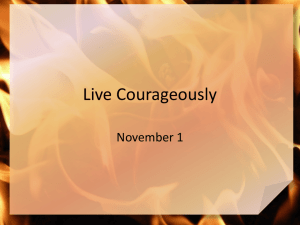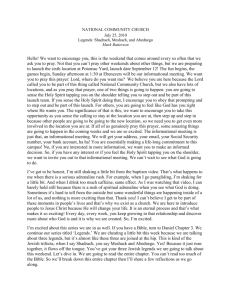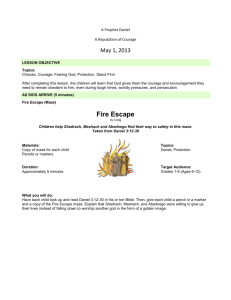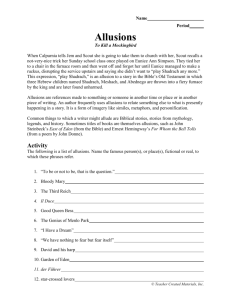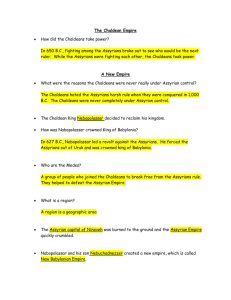File - Grace Chapel Online
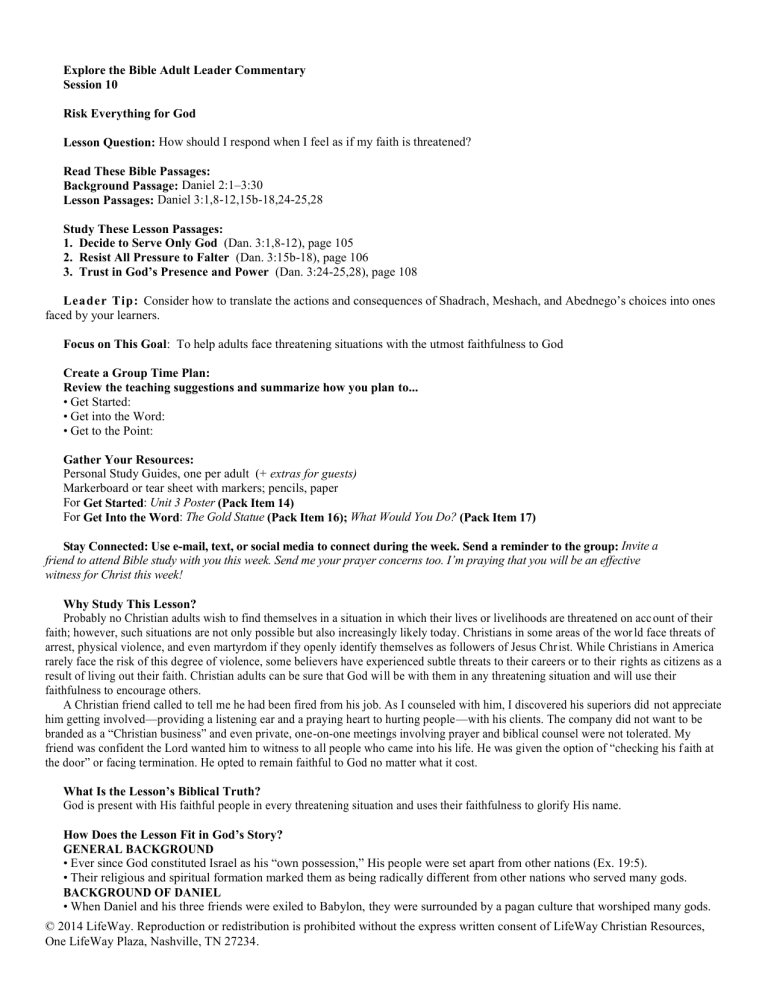
Explore the Bible Adult Leader Commentary
Session 10
Risk Everything for God
Lesson Question: How should I respond when I feel as if my faith is threatened?
Read These Bible Passages:
Background Passage: Daniel 2:1–3:30
Lesson Passages: Daniel 3:1,8-12,15b-18,24-25,28
Study These Lesson Passages:
1.
Decide to Serve Only God (Dan. 3:1,8-12), page 105
2.
Resist All Pressure to Falter (Dan. 3:15b-18), page 106
3.
Trust in God’s Presence and Power (Dan. 3:24-25,28), page 108
Leader Tip: Consider how to translate the actions and consequences of Shadrach, Meshach, and Abednego’s choices into ones faced by your learners.
Focus on This Goal : To help adults face threatening situations with the utmost faithfulness to God
Create a Group Time Plan:
Review the teaching suggestions and summarize how you plan to...
• Get Started:
• Get into the Word:
• Get to the Point:
Gather Your Resources:
Personal Study Guides, one per adult (+ extras for guests)
Markerboard or tear sheet with markers; pencils, paper
For Get Started : Unit 3 Poster (Pack Item 14)
For Get Into the Word : The Gold Statue (Pack Item 16); What Would You Do?
(Pack Item 17)
Stay Connected: Use e-mail, text, or social media to connect during the week. Send a reminder to the group: Invite a friend to attend Bible study with you this week. Send me your prayer concerns too. I’m praying that you will be an effective witness for Christ this week!
Why Study This Lesson?
Probably no Christian adults wish to find themselves in a situation in which their lives or livelihoods are threatened on acc ount of their faith; however, such situations are not only possible but also increasingly likely today. Christians in some areas of the wor ld face threats of arrest, physical violence, and even martyrdom if they openly identify themselves as followers of Jesus Chr ist. While Christians in America rarely face the risk of this degree of violence, some believers have experienced subtle threats to their careers or to their rights as citizens as a result of living out their faith. Christian adults can be sure that God will be with them in any threatening situation and will use their faithfulness to encourage others.
A Christian friend called to tell me he had been fired from his job. As I counseled with him, I discovered his superiors did not appreciate him getting involved—providing a listening ear and a praying heart to hurting people—with his clients. The company did not want to be branded as a “Christian business” and even private, one-on-one meetings involving prayer and biblical counsel were not tolerated. My friend was confident the Lord wanted him to witness to all people who came into his life. He was given the option of “checking his f aith at the door” or facing termination. He opted to remain faithful to God no matter what it cost.
What Is the Lesson’s Biblical Truth?
God is present with His faithful people in every threatening situation and uses their faithfulness to glorify His name.
How Does the Lesson Fit in God’s Story?
GENERAL BACKGROUND
• Ever since God constituted Israel as his “own possession,” His people were set apart from other nations (Ex. 19:5).
• Their religious and spiritual formation marked them as being radically different from other nations who served many gods.
BACKGROUND OF DANIEL
• When Daniel and his three friends were exiled to Babylon, they were surrounded by a pagan culture that worshiped many gods.
© 2014 LifeWay. Reproduction or redistribution is prohibited without the express written consent of LifeWay Christian Resources,
One LifeWay Plaza, Nashville, TN 27234.
• Failure to acknowledge the One True God results in misplaced worship, even of a mere man or a statue (Dan. 3:1-5).
BACKGROUND PASSAGE (Daniel 2:1–3:30)
• Confronting Impossible Demands (Dan. 2:1-16)—The Chaldean wise men informed Nebuchadnezzar that no one could reveal his dream and its interpretation. Nebuchadnezzar decreed the execution of all the wise men. Daniel asked Nebuchadnezzar for time to interpret the dream.
• Turning to God for Help (Dan. 2:17-49)—God revealed Nebuchadnezzar’s dream and its interpretation to Daniel. As a result,
Daniel and his three friends were elevated to leadership positions in the Babylonian empire.
• Refusing to Compromise Devotion (Dan. 3:1-23)—Shadrach, Meshach, and Abednego refused to compromise their faith.
• Demonstrating Extreme Faith (Dan. 3:24-30)—Nebuchadnezzar witnessed first-hand God’s presence with His servants in the fiery furnace.
DECIDE TO SERVE ONLY GOD (Dan. 3:1,8-12)
1 King Nebuchadnezzar made an image of gold, sixty cubits high and six cubits wide, and set it up on the plain of Dura in the province of Babylon.
. . . . . . . . . . . . . . . . . . . .
8 At this time some astrologers came forward and denounced the Jews. 9 They said to King Nebuchadnezzar, “May the king live forever! 10 Your Majesty has issued a decree that everyone who hears the sound of the horn, flute, zither, lyre, harp, pipe and all kinds of music must fall down and worship the image of gold, 11 and that whoever does not fall down and worship will be thrown into a blazing furnace. 12 But there are some Jews whom you have set over the affairs of the province of Babylon—Shadrach, Meshach and Abednego—who pay no attention to you, Your Majesty. They neither serve your gods nor worship the image of gold you have set up.”
Verse 1.
Some time earlier, Nebuchadnezzar had dreamed of a large statue with a head of gold. Daniel alone was able to recount his dream and reveal its interpretation (see Dan. 2:31-32,36-38). Perhaps influenced by his dream, Nebuchadnezzar made a huge statue overlaid with gold. The dimensions of the statue were designed to gain attention—90 feet high and nine feet wide. It is comparable to large statues found in Egypt, Rhodes, Greece, and Babylon. The plain of Dura is often associated with some ruins just south of the city of Babylon, but the exact site of the statue’s location is unknown.
Relying on the connection to the dream of Nebuchadnezzar in Daniel 2:31-33, some scholars have suggested the statue was of a man, perhaps of Nebuchadnezzar himself. However, the biblical text does not explicitly identify the form of this statue. What is clear from the text is that all of Nebuchadnezzar’s subjects were to obey his decree to fall down and to worship the gold statue (see Dan 3:2-5) when they heard the sound of the various musical instruments. Those who refused to worship the image would face certain death in the furnace of blazing fire.
These verses provide the backdrop for the actions taken by Nebuchadnezzar’s officials against Hananiah, Azariah, and Mishael.
The text also tells us that every level of government was expected to pay homage to Nebuchadnezzar’s image. The satraps, prefects, governors, advisors, treasurers, judges, magistrates, and provincial rulers attended the dedication. So where was Daniel? Most likely Daniel’s specific duties kept him restricted to the king’s palace within the city walls of Babylon (see Dan. 2:49b).
Verse 8.
Some Chaldeans took this occasion to maliciously accuse the Jews. (See Explore More of the Word, “Babylon, Chaldeans.”) The history of the Jewish people is marred by frequent bouts of anti-Semitism. To complicate matters, Hananiah (Shadrach), Mishael (Meshach), and Azariah (Abednego), were aliens in a foreign land. The Chaldeans were the inhabitants of the region who also held positions in the king’s administration, perhaps as some of his wise men. Even today, aliens are treated with disrespect and suspicion due to their strange customs and different religious beliefs. How much the Chaldeans were motivated by the Hebrew’s foreignness and strange religion is not known.
Verse 9. The Chaldeans approached the king humbly and diplomatically. Their expression related to the king living forever was typical for such occasions (see Dan. 2:4; 5:10; 6:21). Nehemiah approached the Persian king Artaxerxes with the same polite expression (see Neh.
2:3). One always risked incurring the king’s wrath if due respect and humility did not precede one’s petition to the king.
Verse 10. The Chaldeans began by contextualizing their comments within the framework of the king’s decree.
The term “decree” renders the Aramaic word for “command” and it carried the full authority of the king. The decree consisted of two parts. Upon hearing the music of the various instruments, everyone was to fall down and worship the gold statue. A person was expected to fall down—face to the ground—as a show of humility. Additionally, each person was required to worship, or pay homage to the statue. To refuse to fall down or to worship the statue meant disobeying the king’s decree, it was considered paramount to disobeying the king himself.
Verse 11. The Chaldeans repeated the king’s warning of dire consequences for failure to fall down and worship the image. Such nonconformists would be thrown into a furnace of blazing fire. The warning given by the king and repeated by the Chaldeans was clear. Failure to obey the king would not be tolerated. Those refusing to comply were to be eliminated immediately.
Verse 12.
As the Chaldeans continued their presentation to Nebuchadnezzar, they specifically focused on Shadrach, Meshach, and
Abednego, identifying them as some Jewish men whom the king had appointed to manage the province of Babylon. The fact these men were
Jewish and in leadership positions contributed to the intensity of the Chaldeans’ feelings against them.
Shadrach, Meshach, and Abednego meant no disrespect to the king. Their failure to bow down to the gold statue was motivated by their own faith relationship with Yahweh, who had commanded His people not to make or to bow down to any graven image (see Ex. 20:4-6).
While they respected Nebuchadnezzar as the king, they necessarily reserved their highest respect for God Almighty. Obeying th e earthly king in this matter would put them at odds with their Heavenly King.
© 2014 LifeWay. Reproduction or redistribution is prohibited without the express written consent of LifeWay Christian Resources,
One LifeWay Plaza, Nashville, TN 27234.
What about us? Would we be true to Jesus if commanded by our government or law to do something contrary to Christ’s teachings?
When the king of Babylon erected a giant statue and required all of his officials to fall down and worship before it, Shadrach, Meshach, and
Abednego ignored the command. As Christians today, based on the teaching in Romans 13:1, we are to submit to our governing leaders as much as faith will allow, meaning we are not to jeopardize or compromise our relationship with God in order to appease an ungodly ruler.
However, Christians do need to be good citizens who obey the laws, pray for leaders, and do their part for the betterment of society. As
Christians, we are to worship and serve God alone, realizing that others may not appreciate our devotion to God or may try to use it against us for harm. We honor God the most when we decide to worship Him only.
Question: Given social and moral changes, how might Christians be maliciously accused as culture moves away from Christian values?
RESIST ALL PRESSURE TO FALTER (Dan. 3:15b-18)
15b But if you do not worship it, you will be thrown immediately into a blazing furnace. Then what god will be able to rescue you from my hand?”
16 Shadrach, Meshach and Abednego replied to him, “King Nebuchadnezzar, we do not need to defend ourselves before you in this matter. 17 If we are thrown into the blazing furnace, the God we serve is able to deliver us from it, and he will deliver us from Your Majesty’s hand. 18 But even if he does not, we want you to know, Your Majesty, that we will not serve your gods or worship the image of gold you have set up.”
King Nebuchadnezzar gave the three men a second chance to bow down to his golden statue. They were pressured to worship an image and in so doing to violate the Second Commandment (see Ex. 20:4-6).
Verse 15b. In an effort to intensify his pressure on the three exiles and to underscore his intolerance of any disobedience, Nebuchadnezzar told them if they didn’t worship the statue, they would be immediately thrown into a furnace of blazing fire. Choices have consequences!
Hananiah, Azariah, and Mishael, were faced with the dilemma of worshiping an idol and being allowed to live or being true to God and facing immediate death. Nebuchadnezzar was so sure of himself he asked the three men who could possibly rescue them from his power, from his hand? Another way to summarize this question would be, “Are you so certain about the God whom you serve that you would risk your life to find out if your faith is in the right place?”
Verse 16. Keep in mind that the names Shadrach, Meshach, and Abednego were the assigned names of the faithful Israelites Hananiah,
Mishael, and Azariah, respectively. These names are used interchangeably in this lesson to remind readers of their real names. These faithful men told Nebuchadnezzar, “We don’t need to give you an answer to this question.” They were neither being disrespectful or curt; instead, they were informing the king, as far as they were concerned, the issue had been settled long ago when they entered into a covenant relationship with Yahweh their God. They were prepared, and had been for some time, to resist all pressure to falter in their faith.
Verse 17. At first glace, the initial statement the three men made in this verse seems to convey doubt (“If”) on the part of the Hebrew men. However, we affirmed their determination not to falter in their faith in the previous verse. We might better understand the meaning of their statement by exchanging the word “if” with the word “since.” In effect, they were saying, “Since the God we serve exists.” The three men did not doubt God’s existence but rather declared their devotion to God. For them, believing in God meant believing He had the power to rescue them from the furnace of blazing fire and from the king’s power. Since God did exist, then He had power to rescue His servants.
Their faith was in God, not in the king.
Verse 18.
Their next words convey the heart of true faith. These men did not put faith in God for what He might do for them. Was God able to deliver them? Yes, they knew He was able. Would God deliver them? They did not know, but it did not matter. God’s existence and power was not contingent upon what He did or did not do on any given occasion. Hananiah, Mishael, and Azariah knew God’s purpose would be served whether He delivered them from the king’s power or whether they died in the furnace. They were sure of God and His power. They told the king under no circumstance would they serve his gods or worship the statue.
What about us? Are we confident enough in our faith in Jesus Christ that we would be willing to stand up for Him even when our lives, well-being, jobs, families, or homes are threatened? As Christians, we are to worship and serve God alone, realizing others may not appreciate our devotion to Jesus. With God’s help, we can resist temptations to falter in our devotion to God, secure in knowing that our faithfulness will bring honor to God.
Question: How have you responded to challenges to your commitment of faith in God?
TRUST IN GOD’S PRESENCE AND POWER (Dan. 3:24-25,28)
24 Then King Nebuchadnezzar leaped to his feet in amazement and asked his advisers, “Weren’t there three men that we tied up and threw into the fire?”
They replied, “Certainly, Your Majesty.”
25 He said, “Look! I see four men walking around in the fire, unbound and unharmed, and the fourth looks like a son of the gods.”
. . . . . . . . . . . . . . . . . . . . .
© 2014 LifeWay. Reproduction or redistribution is prohibited without the express written consent of LifeWay Christian Resources,
One LifeWay Plaza, Nashville, TN 27234.
28 Then Nebuchadnezzar said, “Praise be to the God of Shadrach, Meshach and Abednego, who has sent his angel and rescued his servants! They trusted in him and defied the king’s command and were willing to give up their lives rather than serve or worship any god except their own God.
The determined faith of Shadrach, Meshach, and Abednego, was matched only by Nebuchadnezzar’s rage at their refusal to obey him. In the heat of his anger, he ordered the furnace heated seven times hotter than normal. The first hint that Nebuchadnezzar did n ot quite have everything in hand was when his strongest soldiers died while throwing the three Israelites into the furnace (see Dan. 3:20-23).
Verse 24.
Nebuchadnezzar jumped up in alarm, or in literal Aramaic, “he was startled and arose frightened.” The death of his soldiers no doubt caused the alarm, but when he looked into the furnace, his alarm turned to fright. His question to his advisers about the number of men thrown into the furnace was rhetorical. The king knew precisely how many men were tied up and thrown into the fire. His question served to underscore his personal shock at what his eyes most definitely were seeing.
Verse 25. Nebuchadnezzar saw one sight that had four aspects. First, instead of three men, he saw four men.
The three Israelites had help
Nebuchadnezzar had not counted on. Second, instead of being tied, they were not tied. Symbolically and physically, Nebuchadnezzar was shown to have no power over God’s servants. Third, instead of being consumed in flames, they were walking around in the fire unharmed. Why didn’t they come out of the furnace? Since God had rendered the furnace of no consequence, why not stay in the flames and fellowship with the
One whom God had sent to help them and to demonstrate His power to the king.
Fourth, the king described the unknown fourth man as one who looked like a son of the gods. The Aramaic verb means “to resemble.”
The King James Version renders the phrase “like the Son of God,” a clear reference to the preincarnate Christ. Many refer to this event as a
Christophany, an appearance of the preexistent Christ. The rendering in other translations reflects Nebuchadnezzar’s theology as a pagan king who served many gods. He was not sure what he was seeing but he believed if an extra person appeared in the fire, the fourth man had to be there by a deity. Nebuchadnezzar referred to this fourth man as an “angel” (3:28).
Nebuchadnezzar ordered the three men to come out of the furnace (v. 26). Nebuchadnezzar’s other government officials, perhaps including the very ones who indicted Hananiah, Mishael, and Azariah, observed that the fire had no effect on their bodies. No hair was singed, their robes were unaffected, and they didn’t even smell like smoke (v. 27).
Verse 28. To Nebuchadnezzar’s credit, he responded correctly to this unforeseen change of events. He exclaimed praise to the God of
Shadrach, Meshach, and Abednego! These three men had trusted in God’s presence and power. They had resisted all pressure to falter in their faith in Him. As a result, the most powerful ruler of their time ended up proclaiming praise to God. Though the pagan king did not fully understand whom their God had sent, describing the fourth man as His angel , he nonetheless gave God full credit for the three men’s deliverance. Further, Nebuchadnezzar made the connection between the Hebrews’ deliverance and the fact they trusted in Him. The verb
“trusted” is an Aramaic word meaning “to rely on” someone.
We can face any tests of our devotion to God with confidence, trusting that He will be present with us in all circumstances and anticipating that He can use our faithfulness to glorify His name. The biblical truth of this lesson is that God is present with His faithful people in every threatening situation and uses their faithfulness to glorify His name.
Question: In what ways have you experienced Jesus’ presence and power during extreme circumstances or trials of your faith?
WHAT NOW? MY MISSION
How can you lead learners to put into action this week what you’ve learned in God’s Word about showing faithfulness to God in threatening situations?
Worship and serve God alone even when others oppose you.
Resist temptations to falter in your devotion to God, knowing your faithfulness will honor God.
Face all tests of your devotion to God with confidence, knowing your faithfulness glorifies His name.
KEY DOCTRINE:
GOD IS FAITHFUL
The Holy Spirit cultivates Christian character, comforts believers, and bestows the spiritual gifts by which they serve God through
His church. He seals the believer unto the day of final redemption.
EXPLORE MORE OF THE WORD
Babylon, Chaldeans (Dan. 3:1,8,12)
Babylon is the geographical locale of this session. Yet, Shadrach’s, Meshach’s, and Abednego’s antagonists were called Chaldeans
(3:8). Babylon is a geographical name referring to the mid-to-southern part of Mesopotamia—what we refer to as Iraq today. The region took its name from the key city, Babylon, where King Hammurabi had his capital (1763-1750 B.C.). “Chaldeans” is a name given to a specific people group, in this case an Aramean tribe known as the Kaldai, who settled in lower Mesopotamia (Babylon) about the same time David and Solomon were ruling Israel. The Chaldeans became the dominant people group in the region of Babylon and were often called “Babylonians.” Scholars differentiate between the original Babylonians led by Hammurabi and the Chaldeans by referring to the latter as “Neo-Babylonians.”
The Chaldeans were the ones who deported Daniel and his friends in 605 B.C. and destroyed the city of Jerusalem and its temple in
586 B.C. The period between 586-539 B.C. is known as the Babylonian Captivity. “Babylon” became such an icon of the enemy of God’s
© 2014 LifeWay. Reproduction or redistribution is prohibited without the express written consent of LifeWay Christian Resources,
One LifeWay Plaza, Nashville, TN 27234.
people that even New Testament writer’s applied the name as a veiled reference to Rome (I Peter 5:13; Rev. 16:19; 17:5; 18:2,10,21 ).
© 2014 LifeWay. Reproduction or redistribution is prohibited without the express written consent of LifeWay Christian Resources,
One LifeWay Plaza, Nashville, TN 27234.
